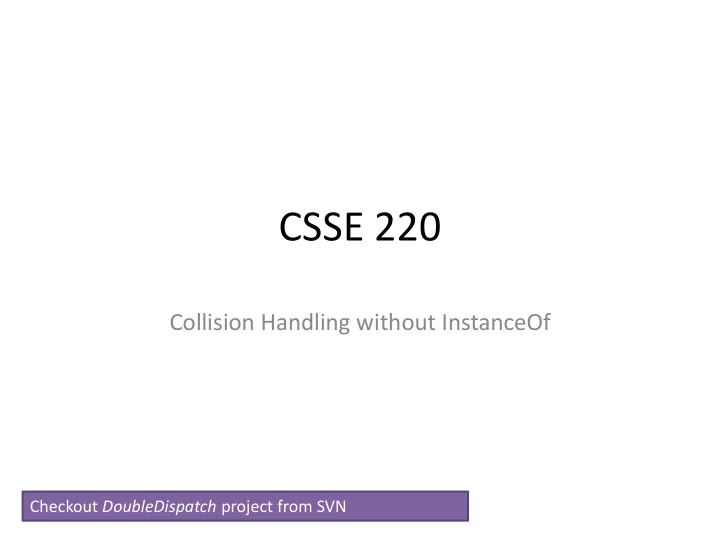

CSSE 220 Collision Handling without InstanceOf Checkout DoubleDispatch project from SVN
InstanceOf • If you do inheritance correctly, you shouldn’t need instanceOf … – Centipede game doesn’t make this easy – Why? • Because interactions between monsters depend on the type of each object • How do we do this? – Double Dispatch!
Let’s say you have this class … public abstract class Monster { public abstract void collide(Monster m); public abstract void collide(Mushroom m); public abstract void collide(Centipede m); public abstract void collide(Scorpion m); }
Late-Binding with Params ? Uh oh… • So this code: Monster m = getCollidedMonster(); //We’ll say getCollidedMonster() returned a Mushroom this.collide(m); • What method is called? – collide(Monster monster) • NOT collide(Mushroom mushroom), even though the instantiation type of m was Mushroom • Late-binding only works for the implicit argument (what becomes this ), it doesn’t apply to parameter types.
This would work, but ew …. public abstract class Monster { public void collide(Monster m) { if (m instanceof Mushroom) { this.collide((Mushroom)m); return; Ew means } if (m instanceof Centipede) { Don’t Do This! this.collide((Centipede)m);return; } if (m instanceof Scorpion) { this.collide((Scorpion)m); return; } } public abstract void collide(Mushroom m); public abstract void collide(Centipede m); public abstract void collide(Scorpion m); }
Let’s try Double Dispatch… public interface Monster { void collide(Monster m); void collideWithMushroom(Mushroom m); void collideWithCentipede(Centipede m); void collideWithScorpion(Scorpion m); }
Double Dispatch The key: You know your own type, so let’s say we’re in the Mushroom class, and Monster is of type Centipede: public class Mushroom implements Monster { public void collide(Monster m) { m.collideWithMushroom( this); } public void collideWithMushroom(Mushroom m) { //do specific action } } This will call the collideWithMushroom method on the Centipede class. Then in the Centipede’s collideWithMushroom class, add code for what should happen when a Centipede collides with a Mushroom.
Work time Be sure everyone is getting a chance to drive. TEAM PROJECT
Recommend
More recommend